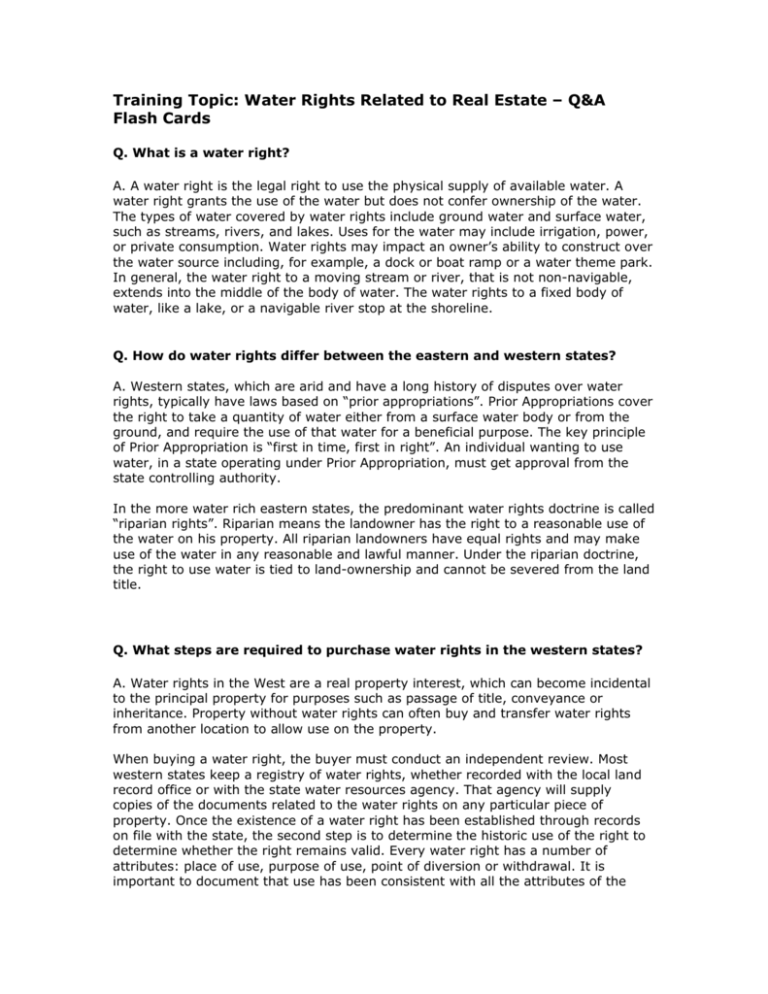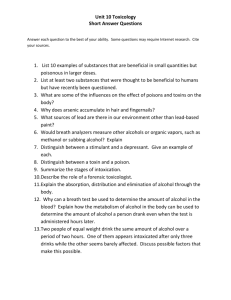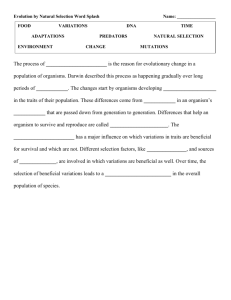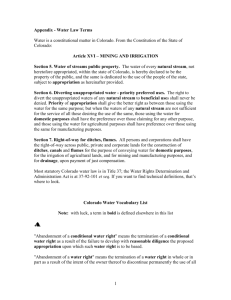Water Rights Related to Real Estate – Flash Cards
advertisement

Training Topic: Water Rights Related to Real Estate – Q&A Flash Cards Q. What is a water right? A. A water right is the legal right to use the physical supply of available water. A water right grants the use of the water but does not confer ownership of the water. The types of water covered by water rights include ground water and surface water, such as streams, rivers, and lakes. Uses for the water may include irrigation, power, or private consumption. Water rights may impact an owner’s ability to construct over the water source including, for example, a dock or boat ramp or a water theme park. In general, the water right to a moving stream or river, that is not non-navigable, extends into the middle of the body of water. The water rights to a fixed body of water, like a lake, or a navigable river stop at the shoreline. Q. How do water rights differ between the eastern and western states? A. Western states, which are arid and have a long history of disputes over water rights, typically have laws based on “prior appropriations”. Prior Appropriations cover the right to take a quantity of water either from a surface water body or from the ground, and require the use of that water for a beneficial purpose. The key principle of Prior Appropriation is “first in time, first in right”. An individual wanting to use water, in a state operating under Prior Appropriation, must get approval from the state controlling authority. In the more water rich eastern states, the predominant water rights doctrine is called “riparian rights”. Riparian means the landowner has the right to a reasonable use of the water on his property. All riparian landowners have equal rights and may make use of the water in any reasonable and lawful manner. Under the riparian doctrine, the right to use water is tied to land-ownership and cannot be severed from the land title. Q. What steps are required to purchase water rights in the western states? A. Water rights in the West are a real property interest, which can become incidental to the principal property for purposes such as passage of title, conveyance or inheritance. Property without water rights can often buy and transfer water rights from another location to allow use on the property. When buying a water right, the buyer must conduct an independent review. Most western states keep a registry of water rights, whether recorded with the local land record office or with the state water resources agency. That agency will supply copies of the documents related to the water rights on any particular piece of property. Once the existence of a water right has been established through records on file with the state, the second step is to determine the historic use of the right to determine whether the right remains valid. Every water right has a number of attributes: place of use, purpose of use, point of diversion or withdrawal. It is important to document that use has been consistent with all the attributes of the authorized use, and that this use has been consistent throughout the life of the water right. Q. What should a buyer consider in terms of water rights? A. A buyer should make sure your water rights are transferred with the sale of the property. Once someone has owned the water rights, and has put the water to beneficial use, most states do not require that person to give up those rights. The original seller should convey the water rights in the same manner as they would a normal property deed. Most states also require a written explanation of water rights ownership. The re-allocation of a water right by a buyer for the use of water at a different location and/or different use requires permission of state authorities and permit applications must be filed with state authorities. Usually, a notice of intention to move the water rights and/or to change the point of diversion and/or location and/or purpose of use must be published to provide notice to the public. If someone objects to the purpose of the transfer and use, they may file a protest. If no protest is filed, state authorities will operate under their own authority and approve or deny an application. Q. What are the implications of the “beneficial use” requirement in maintaining water rights? A. Beneficial use usually involves an economic or life-sustaining activity where some of the water is consumed. For example, water that is used to grow vegetables, irrigate, support wildlife, enhance recreation, or general household use are beneficial uses. Beneficial use may also include industrial or commercial uses such as mining, manufacturing chemicals, or growing fish in hatcheries. To meet beneficial use ownership requirements, the owner must use of a reasonable amount of water necessary to accomplish the purpose of the appropriation, without waste. Beneficial use is a cardinal principle of the Prior Appropriation Doctrine. State constitutions, statutes, or case law may define uses of water that are beneficial, those uses may be different in each State, and the definition of what uses are beneficial may change over time. The right to use water established under State law may be lost if the beneficial use is discontinued for the prescribed period of time.











